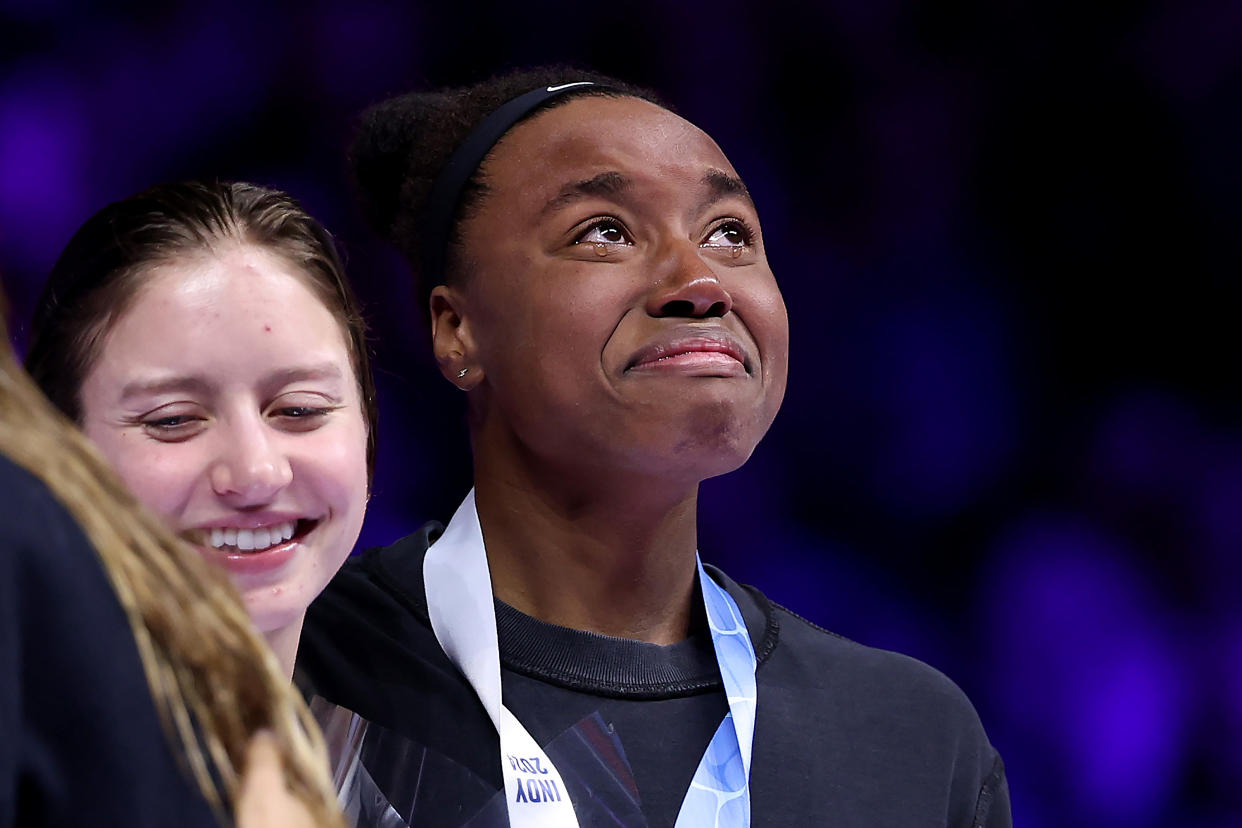Simone Manuel, on a ‘healing’ night at Olympic trials, caps a remarkable comeback from ‘ground zero’
INDIANAPOLIS — Simone Manuel’s lips began to quiver, and years of emotion gripped her resilient face. She had just qualified for her third Olympics here at U.S. swimming trials, but the tears that welled came from a much deeper place.
They came from the spring of 2021, when her body began to fail her. They came from her couch, where she spent months felled by overtraining syndrome, a mysterious medical condition. They came from the loneliness she always felt in her sport, and especially from the aftermath of the Tokyo Olympics, when she “felt even more alone.”
They came from every stage of a remarkable comeback, which “started from ground zero,” as Manuel said, and culminated Wednesday.
Manuel wasn’t thrilled with her time in the 100-meter freestyle final, a 53.25 that left her three tenths of a second off a berth in the event in Paris. As she rose on a platform elevator into spotlights here at Lucas Oil Stadium, parts of her expression looked glum.
But her fourth-place finish clinched her a spot on a star-studded 4x100 relay, and capped a journey laden with obstacles and pain.
“When I really think about how far I've come, and the mountain I had to climb,” Manuel said, “I think it's really important for me to look back and be proud of myself for continuing to fight through this process and believe in myself.”
When asked what it meant to make this U.S. Olympic team, she said: "It means everything to me.”
Everything, and more than any of us could ever know.

Simone Manuel's struggle
It means something different than the first of three, Manuel’s breakout Games, 2016 in Rio de Janeiro. On an unforgettable August night, she won 100-meter freestyle gold. She became the first Black American swimmer to claim a gold medal in an individual event at the Olympics. She earned five medals overall in Rio, and she had just turned only 20.
The following summer, she won five golds at world championships. Two years after that, again at worlds, she brought home four golds and three silvers. She was ascending toward Tokyo greatness, until the pandemic struck, and pools closed, and everything changed.
A year later, with muscles sluggish and times stagnant, she sought doctors, who diagnosed her with overtraining syndrome, or OTC, a condition far more serious and real than it sounds.
Her body, essentially, had begun responding adversely to any intense exercise. She dealt with soreness, insomnia, an elevated heart rate, anxiety, and physical and mental exhaustion. She'd get "gassed" climbing stairs. With the Olympics months away, she often couldn’t or didn’t want to practice.
She revealed her struggle to the world at a brave news conference that June, after failing to make the final of her signature race, the 100, at U.S. trials. She ultimately qualified in the 50 free, but didn’t make the Olympic final. And her Tokyo experience was miserable; when asked Wednesday whether she enjoyed it at all, she said: “No.”
Upon returning home, between racing thoughts and fits of tears, her doctor offered a basic but agonizing prescription: indefinite rest.
The several months that followed, deprived of even a slow jog or a light lift, were “probably the most boring months of my life,” she told the Associated Press.
They were also lonely months.
The broader swimming community hadn’t universally accepted her diagnosis, which some fans incorrectly saw as merely an extension of laziness or surmountable fatigue.
“I didn't feel as though I got the support that I would've hoped for,” Manuel said Wednesday, “or the grace in talking about my journey that I had hoped for.”
Naturally, she also doubted whether she’d ever return to Olympic-level swimming. She never seriously considered giving up the sport for good; but in the winter of 2022, when finally cleared to return, she knew how far away she was.
'I'm not as lonely as I thought'
She began her comeback with a change of scenery, a move to train under Bob Bowman and Herbie Behm at Arizona State. She eased into workouts that spring, slowly, carefully, as doctors monitored her body’s response to each new degree of stress, to prevent an OTC recurrence. Sets often had to be modified. Practices regularly kicked her butt. When 2022 gave way to 2023, she still hadn’t raced in 17 months.
She grinded and grew throughout 2023. It wasn’t until 2024, though, that Manuel started feeling something akin to her former self. In May, she swam her fastest 100 free in nearly five years, and firmly established herself as a contender for Paris.
At trials here on Tuesday night, she stretched to beat Gretchen Walsh and Kate Douglass in their semifinal. She slowed ever so slightly in the final, which is why her emotions in the immediate aftermath were complicated.
But here, standing beside Walsh and Douglass and Torri Huske on a podium, she looked around, and that’s when her face began to scrunch. She saw a record-breaking crowd of 22,209. They’d screamed for her louder than they had for anybody else. She felt Douglass’ arm around her shoulder. She welcomed Walsh’s embrace.
And she thought about how, on this unprecedented stage, the loneliness had disappeared.
“Being in this arena, and being surrounded by these fans, honestly has been so healing,” Manuel said. “To know that these people are just excited to see me swim again, swim at this level again, is something that's really special.”
That perspective, naturally, had escaped her at times, but here, as she splashed toward a third Olympics, it returned as powerfully as ever.
“It's something, that, I think I'm appreciating even more,” Manuel said. “That I'm not as lonely as I thought I was. And that there's people who really care, and are excited to see me swim, and be an inspiration.”


